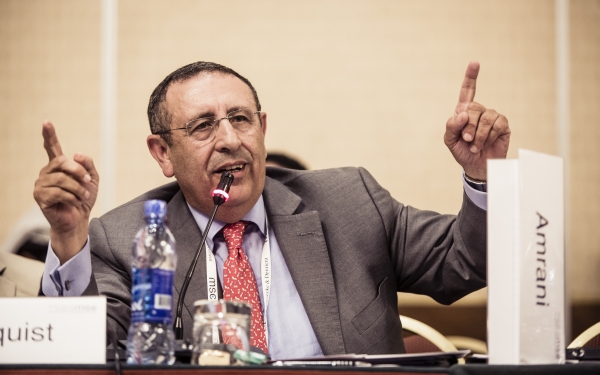
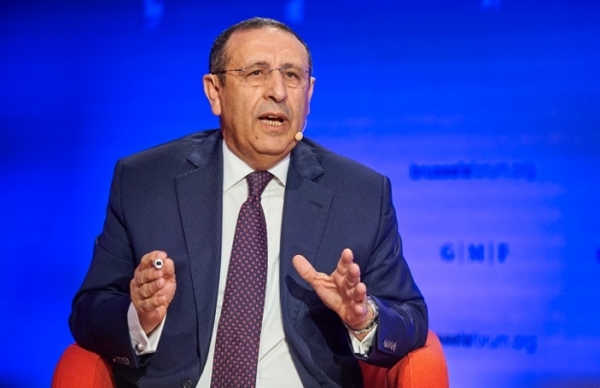
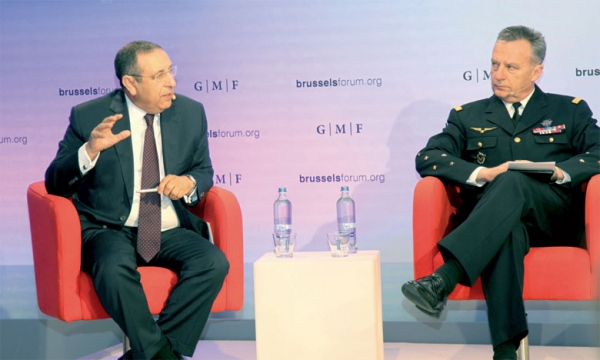
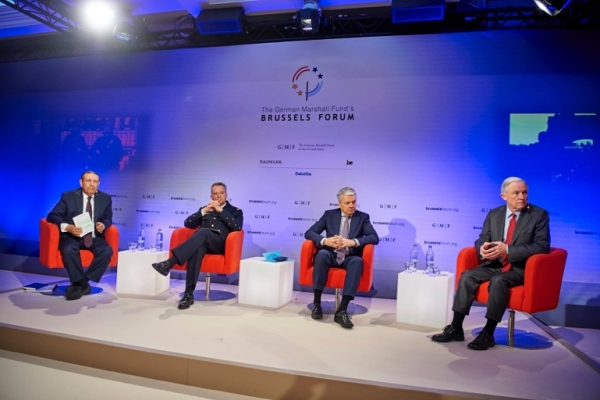
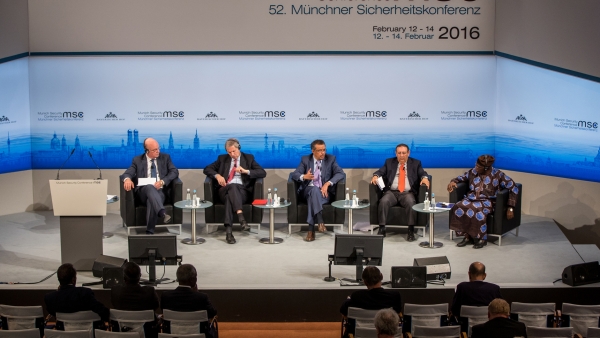
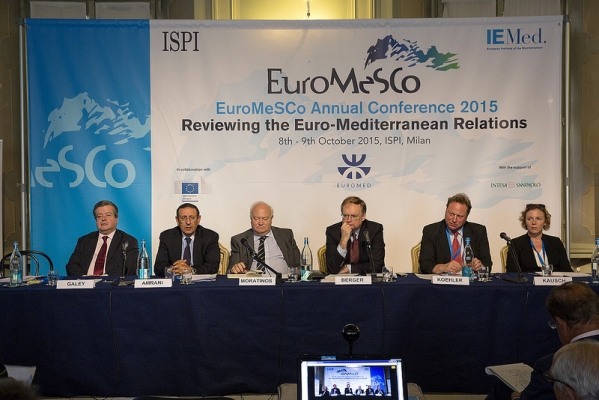
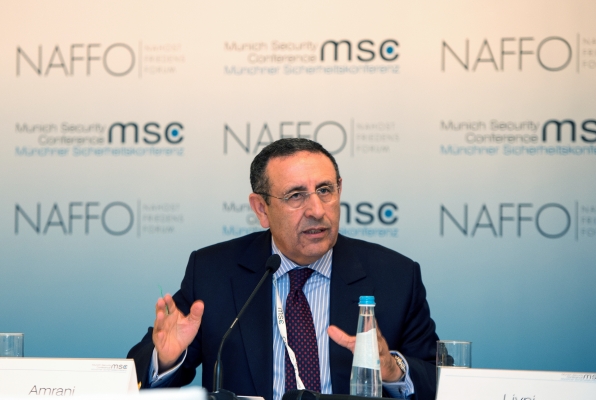
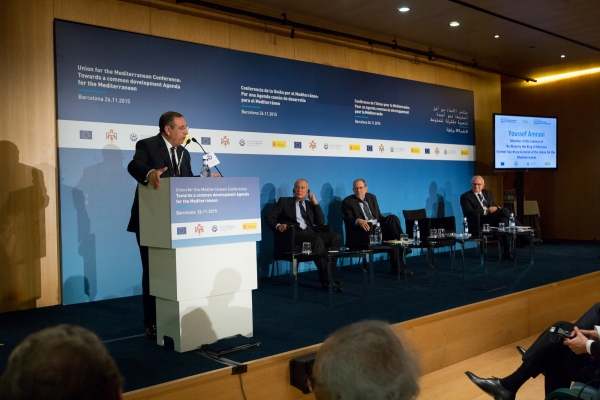
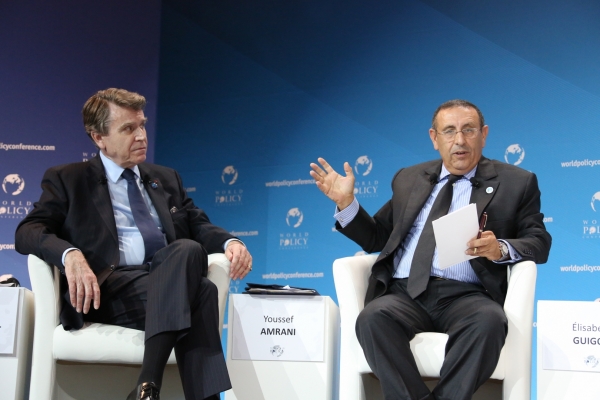

Agenda item « Threats to international peace and security caused by terrorist acts »
Special Debate on “Global Approach to counter-terrorism”
15 January 2013
Madam President,
I would like to express our deep appreciation to Pakistan for convening a Special Debate under its presidency of the Security Council on the important subject of a ‘comprehensive approach to counterterrorism’. The Kingdom of Morocco shares your commitment to strengthen the international fight against terrorism and welcomes the concept paper prepared by the Pakistani delegation for this debate.
I would also like to thank the Secretary-General for his insightful briefing and commend his commitment to reinforce United Nations leadership in combating terrorism and in mobilizing resources and expertise to strengthen the capacity of member States.
Over the past few years, the international community has steadily built stronger consensus, efficient strategies and a robust architecture seeking to better respond to terrorism.
These major efforts have disrupted terrorist structures, foiled a number of terrorist plots, and weakened the central command of major terrorist groups. However, the trends and methods of international terrorism continue to evolve and terrorist groups are constantly adapting their modus operandi. Terrorist groups have developed a more regional agenda, with an even stronger nexus existing between terrorists and transnational organized crime networks and a more intensive use of information and communication Technology.
Terrorism is a highly complex and multidimensional phenomenon that we must address through renewed consensus and effective cooperation. To be effective, our collective response to terrorism should rely on a comprehensive approach and dedicated strategies at the national, regional and international levels.
The United Nations, as the appropriate and legitimate multilateral framework, has developed a robust counterterrorism architecture. Over the past decade, the Security Council has shown remarkable determination in countering terrorism through a significant number of resolutions and continues to strengthen the work of its counter-terrorism Committees. As Chair of the Counter Terrorism Committee, Morocco is committed to working with all Member States to strengthen the action taken by the CTC to consolidate a strategic, transparent approach and further strengthen facilitation and coordination of the provision of technical assistance seeking to enhance Member States’ capacities to counter terrorism.
The United Nations Global Counter-Terrorism Strategy, adopted by the General Assembly in 2006, represents the most comprehensive and effective decision taken by the International Community to eliminate this dangerous threat and improve United Nations action. The third review of the Strategy in June 2012 provided us a key opportunity to reaffirm the commitment of the International Community to implement its four pillars in a balanced and comprehensive manner and to assess the progress achieved by member States. It also allowed us to emphasize the importance of enhancing our solidarity with the victims of terrorism and strengthening capacity building activities.
We commend the United Nations Counter-Terrorism Implementation Task Force (CTITF) for its constant efforts to coordinate international support. The United Nations Center on Counter-Terrorism, initiated by the Kingdom of Saudi Arabia, is already engaged with the CTITF in developing significant capacity-building activities following the recent approval of 12 projects touching on different aspects of counterterrorism. We are committed to work together with other members of the Center’s Advisory Board to achieve its vital objectives.
Madam President,
Despite all these positive developments, terrorism remains a prominent threat to international peace and security. The United Nations must intensify its efforts, adapt its responses to the new patterns of terrorism and diversify its partnership with regional and sub-regional Organizations.
In this context, we reiterate our readiness to pursue discussions on all proposals seeking to further enhance coherence, coordination and effectiveness of UN counter-terrorism efforts, including the proposal of the Secretary General to appoint a UN counter-terrorism Coordinator.
Likewise, the United Nations should explore better ways to interact with other multilateral initiatives actively involved in the global fight against terrorism.
In this regard, allow me to recall the important work conducted by the Global Initiative to Combat Nuclear Terrorism (GICNT), seeking to improve national and international capacities for prevention, detection and response to a nuclear terrorist event. The Statement of Principles adopted by the CICNT in its first meeting held in Rabat, in 2006, provides a relevant basis to unite and share- on voluntary basis – experience and expertise in this critical field of countering nuclear terrorism.
We would also like to highlight the early and important achievements of the Global Forum against terrorism (GCTF), in particular the Rabat Memorandum adopted last year on ‘Good Practices for Effective Counterterrorism Practice in the Criminal Justice Sector’. This platform offers a set of norms for an effective criminal justice response to terrorism and for enhancing the individual capabilities of Member States, in their efforts to develop and implement counterterrorism practices based on the Rule of Law.
As an active member of GCTF, Morocco hosted in October 2012 the GCTF Workshop on Transnational Security Challenges in the South Atlantic. This expert-level workshop identified ways to strengthen international cooperation and build the necessary capacities to counter terrorism, transnational crime, and illicit networks in the South Atlantic area.
Recently, the GCTF ministerial meeting, held in Abu Dhabi on 14 December 2012, adopted new steps related to victims of terrorism and to prevent kidnapping for ransom. During the same meeting, the United Arab Emirates announced the official launch of the ‘Hedayah Center’, the first international center of excellence for countering violent extremism, based in Abu Dhabi and drawing on the resources and expertise of the GCTF membership.
Madam President,
Morocco has established a comprehensive and multidimensional counter-terrorism approach rooted in its early commitment to contribute actively to the preservation of peace and security at all levels. This Strategy is guided by Morocco’s attachment to the values of tolerance, human rights, fundamental freedoms and the Rule of Law. It also converges with the United Nations Strategy and complies with the Charter, as well as other relevant United Nations’ resolutions and international legal instruments to which Morocco is party.
This proactive Moroccan approach was successfully translated into firm and preventive law-enforcement measures, with a dedicated counter-terrorism justice system as well as national initiatives aiming to address the various social, economic and cultural factors involved.
Our effective approach is rooted in a series of essential building blocks, in particular the total rejection by all Moroccan citizens of terrorism and violence as means to achieve political objectives. Our firm commitment to pursue irreversible democratic reforms, with human development as a shared priority, provides Morocco with the best safeguard against the spread of violent extremism.
Madam President,
Morocco has devoted equal attention and commitment to prevent the spread of terrorism and extremism at the regional level.
For years, Morocco has persistently warned the International Community about the deteriorating situation in the Sahel region, which continues to face complex multidimensional and interconnected challenges. The Sahel has emerged today as the center stage of alarming activities involving terrorist and extremist groups that threaten the stability and the security of the states of the Sahel, West Africa and the Maghreb.
A year ago, the State of Mali saw the northern part of its territory slide progressively into the hands of armed, extremist and terrorist groups. Two thirds of its territory now lies in the hands of terrorist elements whose confidence is ever increasing given the slow response of the international community to dislodge them. This state of mind has been reflected by their actions last week, when they broke the ongoing de-facto 6 months cease-fire, thereby defying the decisions taken by the Security Council by taking over the town of Konna and progressing further southwards.
In the wake of these alarming developments, Morocco supports the recent call of the Government of Mali for outside assistance to combat these terrorist elements and the response that is now being provided by bilateral partners. The United Nations needs to speed up and intensify its efforts in assisting the government of Mali and in ensuring a prompt deployment of AFISMA on the ground. Bilateral support and fast mobilization of resources and logistical support to AFISMA, including through the holding of a donor’s conference, are now more than ever a necessity.
At the regional level, let me reiterate our call for a sustainable framework for dialogue, cooperation and solidarity – one that encompasses all States of the Sahel and the Maghreb in order to address in a holistic and effective manner the critical situation in the Sahel region. Narrow political calculations must yield the way to joint responsibility, inclusive cooperation and constructive partnership.
In conclusion Madam President,
Terrorism emanates from a complex set of interrelated political, economic and social factors. In combating it, we should not lose sight of the need to address its underlying causes by promoting political reforms and human development, eliminating social injustice and resolving regional conflicts. To provide sustainable solutions, terrorism must be addressed in a holistic manner that does not rely solely on military and law enforcement measures.
We thereby firmly believe that the United Nations should remain the central framework to effectively take forward our fight against terrorism. We are equally convinced that national counter terrorism strategies should include systematic and efficient regional and sub-regional cooperation. Comprehensive approaches to counterterrorism have indeed proven successful wherever adopted and fully implemented.
In keeping with its values and principles, Morocco intends to remain an active and fully committed partner of the United Nations and the entire international Community in the global fight against the scourge of terrorism
Our commitment is none better expressed than by the words of His Majesty the King Mohammed VI « As regards the fight against terrorism, Morocco will continue to implement a comprehensive, multidimensional strategy, in which security, democratic reforms and development efforts support and complement one another. Under that strategy, cultural creativity and enlightened thinking will also be encouraged, together with a firm commitment to the rule of law and to equality before the law and the nation’s legal system« .